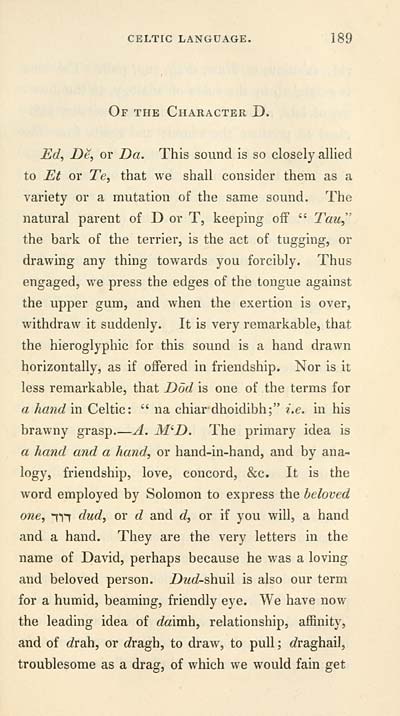Download files
Complete book:
Individual page:
Thumbnail gallery: Grid view | List view

CELTIC LANGUAGE. 189
Of the Character D.
Ed, De, or Da. This sound is so closely allied
to Et or Te, that we shall consider them as a
variety or a mutation of the same sound. The
natural parent of D or T, keeping off " Tau^"
the bark of the terrier, is the act of tugging, or
drawing any thing towards you forcibly. Thus
engaged, we press the edges of the tongue against
the upper gum, and when the exertion is over,
withdraw it suddenly. It is very remarkable, that
the hieroglyphic for this sound is a hand drawn
horizontally, as if offered in friendship. Nor is it
less remarkable, that Dod is one of the terms for
a hand in Celtic: " na chiardhoidibh;" i.e. in his
brawny grasp A. M^D. The primary idea is
a hand and a hand, or hand-in-hand, and by ana-
logy, friendship, love, concord, &c. It is the
word employed by Solomon to express the beloved
one, Tn dud, or d and d, or if you will, a hand
and a hand. They are the very letters in the
name of David, perhaps because he was a loving
and beloved person. Dud-'&hxxiX is also our term
for a humid, beaming, friendly eye. We have now
the leading idea of rfaimh, relationship, affinity,
and of rfrah, or c?ragh, to draw, to pull ; c?raghai],
troublesome as a drag, of which we would fain get
Of the Character D.
Ed, De, or Da. This sound is so closely allied
to Et or Te, that we shall consider them as a
variety or a mutation of the same sound. The
natural parent of D or T, keeping off " Tau^"
the bark of the terrier, is the act of tugging, or
drawing any thing towards you forcibly. Thus
engaged, we press the edges of the tongue against
the upper gum, and when the exertion is over,
withdraw it suddenly. It is very remarkable, that
the hieroglyphic for this sound is a hand drawn
horizontally, as if offered in friendship. Nor is it
less remarkable, that Dod is one of the terms for
a hand in Celtic: " na chiardhoidibh;" i.e. in his
brawny grasp A. M^D. The primary idea is
a hand and a hand, or hand-in-hand, and by ana-
logy, friendship, love, concord, &c. It is the
word employed by Solomon to express the beloved
one, Tn dud, or d and d, or if you will, a hand
and a hand. They are the very letters in the
name of David, perhaps because he was a loving
and beloved person. Dud-'&hxxiX is also our term
for a humid, beaming, friendly eye. We have now
the leading idea of rfaimh, relationship, affinity,
and of rfrah, or c?ragh, to draw, to pull ; c?raghai],
troublesome as a drag, of which we would fain get
Set display mode to: Large image | Transcription
Images and transcriptions on this page, including medium image downloads, may be used under the Creative Commons Attribution 4.0 International Licence unless otherwise stated. ![]()
| Early Gaelic Book Collections > Blair Collection > History of the Celtic language > (195) |
|---|
| Permanent URL | https://digital.nls.uk/76180754 |
|---|
| Description | A selection of books from a collection of more than 500 titles, mostly on religious and literary topics. Also includes some material dealing with other Celtic languages and societies. Collection created towards the end of the 19th century by Lady Evelyn Stewart Murray. |
|---|
| Description | Selected items from five 'Special and Named Printed Collections'. Includes books in Gaelic and other Celtic languages, works about the Gaels, their languages, literature, culture and history. |
|---|

